Economy
Five reasons why China’s economy is in trouble
|
|
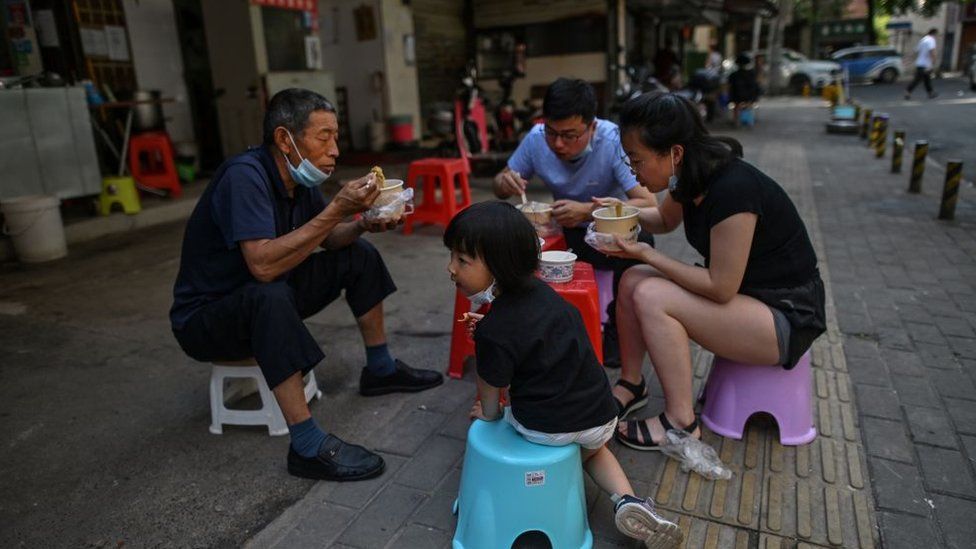

China’s economy is slowing down as it adapts to a punishing zero-Covid strategy and weakening global demand.
Official growth figures for the July to September quarter are expected soon – if the world’s second-largest economy contracts, that increases chances of a global recession. Beijing’s goal – an annual growth rate of 5.5% – is now out of reach although officials have downplayed the need to meet the target. China narrowly avoided contraction in the April to June quarter. This year, some economists do not expect any growth.
The country might not be battling steep inflation like the US and the UK, but it has other problems – the factory of the world has suddenly found fewer customers for its products both domestically and internationally. Trade tensions between China and major economies such as the US are also hampering growth.
All of this is happening at a time when the stakes are especially high for President Xi Jinping – he is expected to secure an unprecedented third term at the Communist Party Congress (CPC) which begins on 16 October.
So what exactly has gone wrong?
1. Zero Covid is wreaking havoc
Covid outbreaks in several cities, including manufacturing hubs like Shenzhen and Tianjin, have been hurting economic activity across industries.
People are also not spending money on things like food and beverages, retail or tourism, putting major services under pressure.
On the manufacturing side, factory activity appears to have climbed back up in September, according to the National Bureau of Statistics.
The rebound could be because the government is spending more on infrastructure.
But it came after two months in which manufacturing did not expand. And it has raised questions, especially since a private survey showed that factory activity actually fell in September, with demand hitting output, new orders and employment.
Demand in countries like the US has declined too because of higher interest rates, inflation and the war in Ukraine.
Experts agree that Beijing could do more to stimulate the economy, but there is little reason in doing so until zero Covid ends.
“There is not a lot of point in pumping money into our economy if businesses cannot expand or people cannot spend the money,” said Louis Kuijs, chief Asia economist at S&P Global Ratings.
2. Beijing isn’t doing enough
Beijing has stepped in – in August it announced a 1 trillion yuan ($203bn; £180bn) plan to boost small businesses, infrastructure and real estate.
But officials can do a lot more to trigger spending to meet growth targets and create jobs.
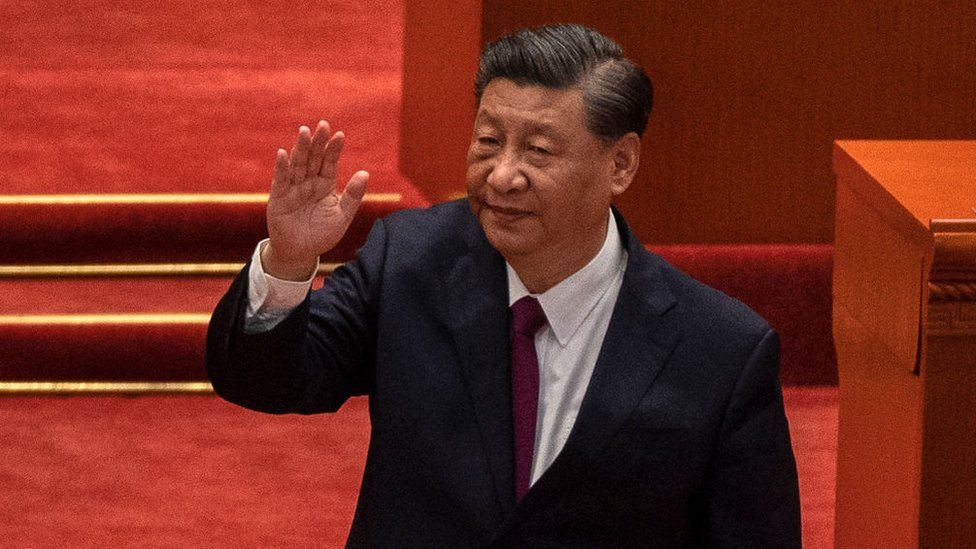

Getty Images
This includes investing more in infrastructure, easing borrowing conditions for home buyers, property developers and local government, and tax breaks for households.
“The response of the government to the weakness in the economy has been quite modest compared to what we have seen during previous economic bouts of weakness,” Mr Kuijs said.
3. China’s property market is in crisis
Weak real estate activity and negative sentiment in the housing sector has undoubtedly slowed growth.
This has hit the economy hard because property and other industries that contribute to it account for up to a third of China’s Gross Domestic Product (GDP).
“When confidence is weak in the housing market, it makes people feel unsure about the overall economic situation,” Mr Kuijs said.
Home buyers have been refusing to make mortgage payments on unfinished buildings and some doubt their houses will ever be completed. Demand is down for new homes and that has reduced the need for imports of commodities used in construction.
Despite Beijing’s efforts to prop up the real estate market, home prices in dozens of cities have declined by more than 20% this year.
With property developers under pressure, analysts say authorities might have to do far more to restore confidence in the real estate market.
4. Climate change is making matters worse
Extreme weather is starting to have a lasting impact on China’s industries.
A severe heatwave, followed by a drought, hit the south-western province of Sichuan and the city of Chongqing in the central belt in August.
As the demand for air conditioning spiked, it overwhelmed the electricity grid in a region that almost entirely relies on hydropower.
Factories, including major manufacturers like iPhone maker Foxconn and Tesla, were forced to cut hours or shut altogether.
China’s Statistics bureau said in August that profits in the iron and steel industry alone were down by more than 80% in the first seven months of 2022, compared to the same period last year.
Beijing eventually came to the rescue with tens of billions of dollars to support energy companies and farmers.
5. China’s tech titans are losing investors
A regulatory crackdown on China’s tech titans – which has already lasted two years – is not helping.
Tencent and Alibaba reported their first drop in revenue in the most recent quarter – Tencent’s profits fell by 50%, while Alibaba’s net income fell by half.
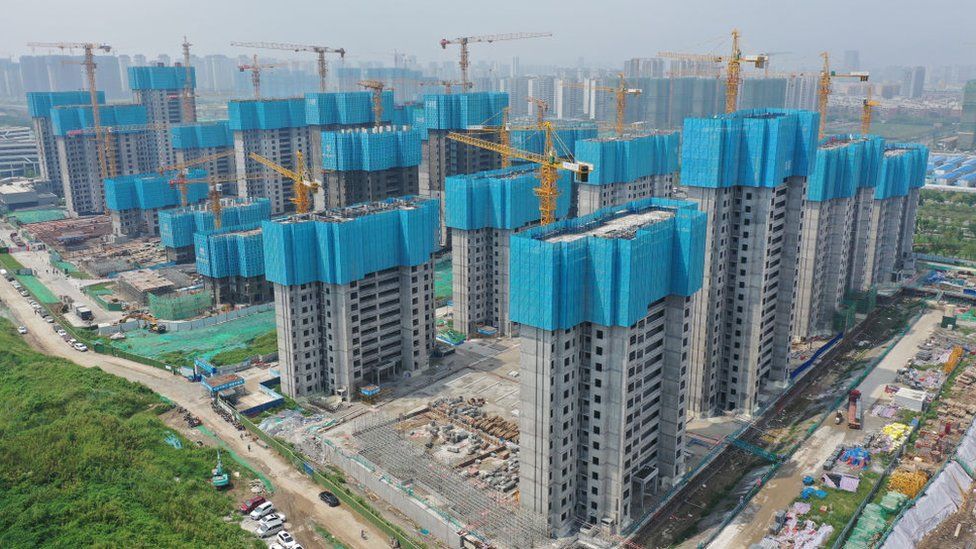

Getty Images
Tens of thousands of young workers have lost work – adding to a jobs crisis where one in five people aged 16 to 24 are unemployed. This could hurt China’s productivity and growth in the long run.
Investors are also sensing a shift in Beijing – some of China’s most successful private companies have come under greater scrutiny as Mr Xi’s grip on power grows.
As state-owned companies appear to be gaining favour, foreign investors are taking money off the table.
Japan’s Softbank pulled out a huge amount of cash from Alibaba, while Warren Buffet’s Berkshire Hathaway is selling its stake in electric vehicle maker BYD. Tencent has had more than $7bn worth of investments withdrawn in the second half of this year alone.
And the US is cracking down on Chinese companies listed on the American stock market.
“Some investment decisions are being postponed, and some foreign companies are seeking to expand production in other countries,” S&P Global Ratings said in a recent note.
The world is becoming accustomed to the fact that Beijing may not be as open for business as it used to be – but Mr Xi is risking the economic success that has powered China in recent decades.


Economy
China’s economy beats expectations, growing 5.3 percent in first quarter – Al Jazeera English
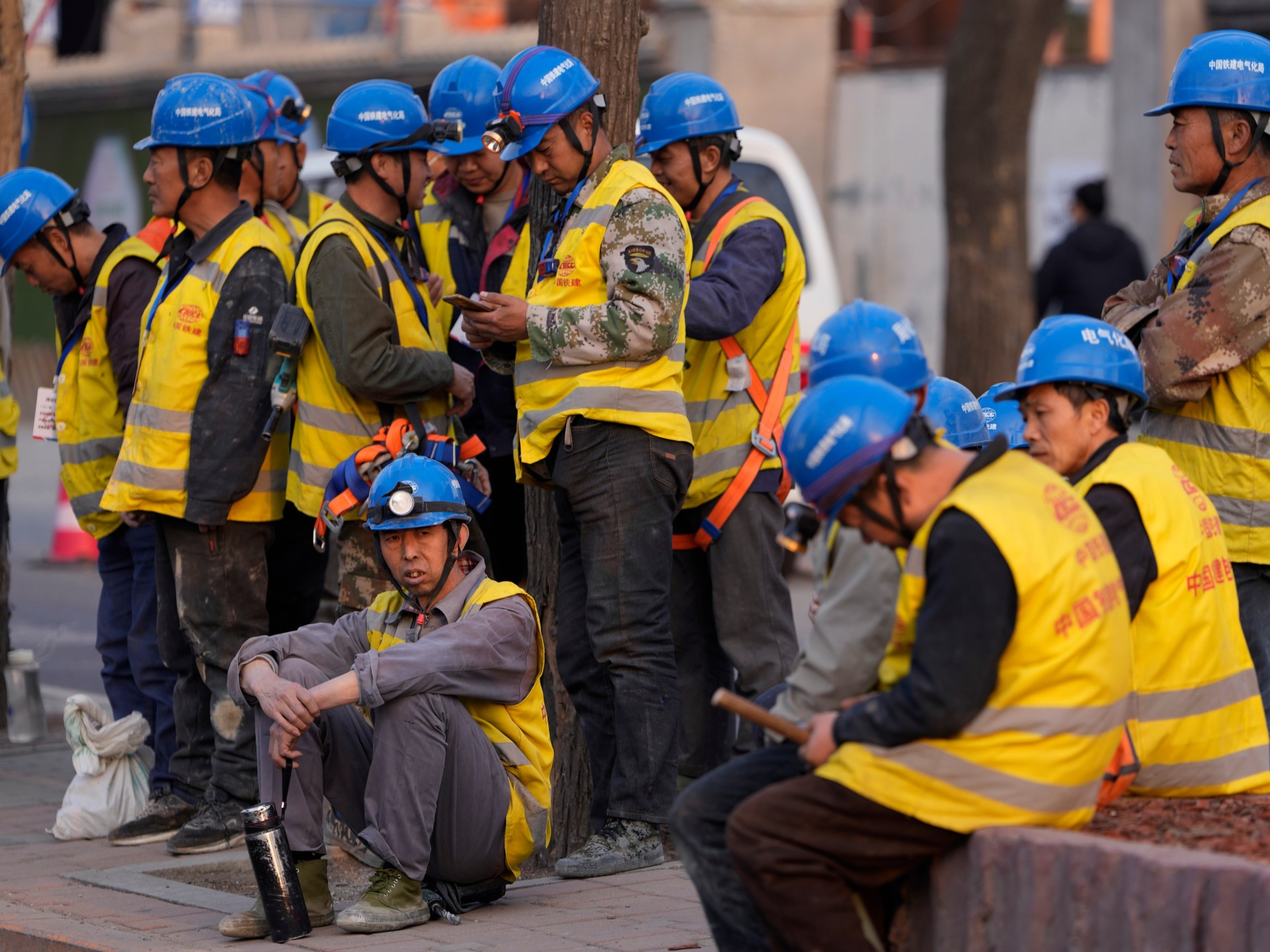

Statistics agency says economy has made ‘good start’ to the year under the leadership of Chinese President Xi Jinping.
China’s economy grew faster than expected in the first three months of the year, a boost for policymakers grappling with a property-sector crisis, weak consumer demand and mounting government debt.
Gross domestic product (GDP) grew by 5.3 percent in the first quarter, data released by the National Bureau of Statistics (NBS) showed on Tuesday, comfortably above forecasts and up from a 5.2 percent expansion in the previous quarter.
By sector, industrial production and agriculture grew by 6.1 percent and 3.8 percent, respectively, while services grew by 5 percent, according to NBS data.
The NBS said in a statement that the economy had made a “good start” under “the strong leadership” of the Central Committee of the Communist Party of China and President Xi Jinping.
“As a result, the policies continued to take effect, production and demands maintained stable and witnessed an increase, employment and prices were generally stable, market confidence continued to boost, and high-quality development made new progress,” the statistics agency said.
The stronger-than-expected figures came days after China reported that exports and imports declined 7.5 percent and 1.9 percent, respectively, in March, missing expectations.
The world’s second-largest economy has struggled to sustain a recovery from the COVID-19 pandemic amid a range of longstanding structural challenges, including a hugely indebted real estate sector and a shrinking population.
Fitch Ratings earlier this month downgraded China’s sovereign credit outlook to negative, citing “increasing risks to China’s public finance outlook” as Beijing attempts to move away from real estate-led growth.
Beijing last month set a 5 percent growth target for 2024, a rate that would beat most developed economies but be among the country’s slowest expansions since 1990.
Officials have unveiled a number of fiscal and monetary policy measures to boost the economy, including $1.8 trillion in spending on major construction and infrastructure projects.
Economy
China’s economy grew 5.3% in first quarter, beating expectations – CityNews Halifax
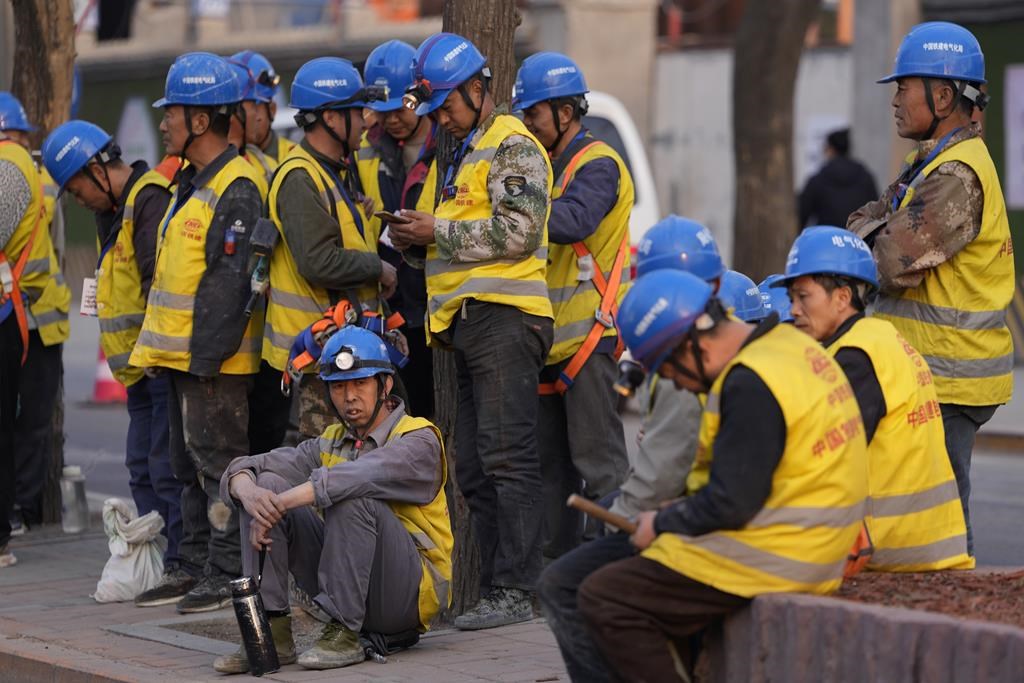

HONG KONG (AP) — China’s economy expanded at a faster than expected pace in the first three months of the year, helped by policies aimed at stimulating growth and stronger demand, the government said Tuesday.
The world’s second-largest economy expanded at a 5.3% annual pace in January-March, beating analysts’ forecasts of about 4.8%, official data show. Compared to the previous quarter, the economy grew 1.6%.
China’s economy has struggled to bounce back from the COVID-19 pandemic, with a slowdown in demand and a property crisis weighing on its growth.
The better-than-expected data Tuesday came days after China reported its exports sank 7.5% in March compared to the year before, while imports also weakened. Inflation cooled, reflecting deflationary pressures resulting from slack demand amid a crisis in the property sector.
Industrial output for the first quarter was up 6.1% compared to the same time last year, and retail sales grew at an annual pace of 4.7%. Fixed investment, in factories and equipment, grew 4.5% compared to the same period a year earlier.
The strong growth in January-March was supported by “broad manufacturing outperformance,” festivities-boosted household spending due to the Lunar New Year holidays and policies that helped boost investments, according to China economist Louise Loo of Oxford Economics.
“However, ‘standalone’ March activity indicators suggest weakness coming through post-Lunar New Year,” she said. “External demand conditions also remain unpredictable, as seen in March’s sharp export underperformance.”
Loo noted that an unwinding of excess inventory, normalization of household spending after the holidays and a cautious approach to government spending and other stimulus will affect growth in this quarter.
Policymakers have unveiled a raft of fiscal and monetary policy measures as Beijing seeks to boost the economy. China has set an ambitious gross domestic product (GDP) growth target of about 5% for 2024.
Such strong growth usually would push share prices across the region higher. But on Tuesday, Asian shares fell sharply after stocks retreated on Wall Street.
The Shanghai Composite index lost 1.4% and the Hang Seng in Hong Kong lost 1.9%. The benchmark for the smaller market in Shenzhen, in southern China, lost 2.8%.
Stronger growth in the region’s biggest economy normally would be seen as a positive for its neighbors, which increasingly rely on demand from China to power their own economies. However, strong growth figures are also viewed as a signal that the government will hold back on further stimulus.
Zen Soo, The Associated Press
Economy
Israeli economy has proven to thrive despite crisis: Expert – Yahoo Canada Finance
Over the weekend, Iran launched a direct attack on Israel. Although Israel successfully intercepted the drones and missiles, the potential for an Israeli retaliation remains uncertain. David Blumberg of Blumberg Capital joins Yahoo Finance to discuss the state of the Israeli economy in light of these developments.
Blumberg claims that Israelis are “somewhat used to these types of things.” Blumberg notes that over the past 25 years, the country has weathered numerous crises, but has achieved consistent growth. He points to Israel’s GDP per capita of $54,000, which exceeds that of some of the world’s largest economies, as evidence of the economy’s ability to “thrive despite and through downturns.”
For more expert insight and the latest market action, click here to watch this full episode of Market Domination Overtime.
This post was written by Angel Smith
Video Transcript
JOSH LIPTON: Over the weekend, Iran launched its first ever direct attack on Israel with a salvo of hundreds of drones and missiles. David Blumberg is currently in Israel where his venture capital firm Blumberg Capital has offices and investments. David joins us now for more on the state of the Israeli economy and tech community. David, it is great to see you and have you on the show.
ADVERTISEMENT
DAVID BLUMBERG: Thank you so much, Josh. Great to see you as always.
JOSH LIPTON: So David, you’re in Israel now. You were obviously there over the weekend during this Iranian attack. So David, I just first want to know how you’re doing.
DAVID BLUMBERG: You can see I’m fine. I’m happy. I feel safe.
With my team here on the ground, we had a meeting with about 20 of our portfolio companies last night. We did it by Zoom instead in meeting. But people are very resilient here.
The streets, you can’t see them. They’re full of people at restaurants. The clubs are– the clubs are busy, traffic jams happening.
It’s remarkable how normal it is in a time when, I think, in America or other places, if this happened, people would be really freaking out. Israelis are unfortunately somewhat used to these kinds of things. This is the most severe it’s ever been. But they really did a great job with the Americans, the British, and the Jordanians, and French to knock down 99.9% of all the projectiles. So I think people feel like they won this battle.
JOSH LIPTON: And so David, the Israeli people a resilient community. At the same time, you know, David, they are engaged in this three-front war. It’s Iran. It’s Hamas to the south. It’s Hezbollah to the north.
It’s an enormous economic burden for the country, David. You just think of soldiers being called up and the tens of thousands of Israelis displaced in the north because of Hezbollah. How does the economy sustain this, David?
DAVID BLUMBERG: Well, I like to always look for history, Josh. So as we recall, over the last 25 years, there have been four or five war conflict situations plus COVID plus the dotcom crash plus a number of other financial crises, et cetera. So if we look at that, we see that over those 25 years, the Israeli GDP per capita measure of productivity of every individual working grew 2% to 3% faster than OECD countries during that same period pretty consistently.
Now, there were downturns and then they’ve come back. But over time, you see this growth. And in fact, I was looking at the data recently, in 2023, Israel achieved GDP per capita of $54,000. Now, that is higher than France, higher than the UK, and higher than Japan, which surprised me to see that growth. Because Israel, when I first started coming here, was a much poorer country.
But the tech boom in particular has really bolstered the economy. And as you’re asking, it seems to thrive despite and through downturns. There are downturns here, but the next year they get stronger.
-
Media19 hours ago
DJT Stock Plunges After Trump Media Files to Issue Shares
-
Business18 hours ago
FFAW, ASP Pleased With Resumption of Crab Fishery – VOCM
-
Media18 hours ago
Marjorie Taylor Greene won’t say what happened to her Trump Media stock
-
Business19 hours ago
Javier Blas 10 Things Oil Traders Need to Know About Iran's Attack on Israel – OilPrice.com
-
Art20 hours ago
It’s Time to Remove Father Rupnik’s Art – National Catholic Register
-
Media17 hours ago
Trump Media stock slides again to bring it nearly 60% below its peak as euphoria fades – National Post
-



 Politics19 hours ago
Politics19 hours agoIn cutting out politics, A24 movie 'Civil War' fails viewers – Los Angeles Times
-
Business24 hours ago
A government mortgage policy that makes sense – with one glaring question – The Globe and Mail




